Systematic Reflection: Mental Health Beliefs and Practices in NSB204
VerifiedAdded on 2022/12/08
|7
|1689
|473
Homework Assignment
AI Summary
This assignment presents a systematic reflection on mental health and illness, prompted by a news article from 1908. The student uses the 5Rs framework—Reporting, Responding, Relating, Reasoning, and Reconstructing—to analyze the article's key issues of confidentiality and stigma surrounding mental health patients. The student reports on the article's content, responds with personal beliefs and opinions, relates the issues to factors like age and gender, reasons about the alignment of the media's portrayal with existing knowledge, and reconstructs their understanding to integrate new insights into future healthcare practices. The reflection emphasizes the importance of fair treatment, confidentiality, and the need for mental health facilities. The student also references several academic sources to support their arguments and perspectives on mental health and illness.

Running head: SYSTEMATIC REFLECTION 1
Systematic Reflection
Name of Author
Institution of Affiliation
Date of Submission
Systematic Reflection
Name of Author
Institution of Affiliation
Date of Submission
Paraphrase This Document
Need a fresh take? Get an instant paraphrase of this document with our AI Paraphraser
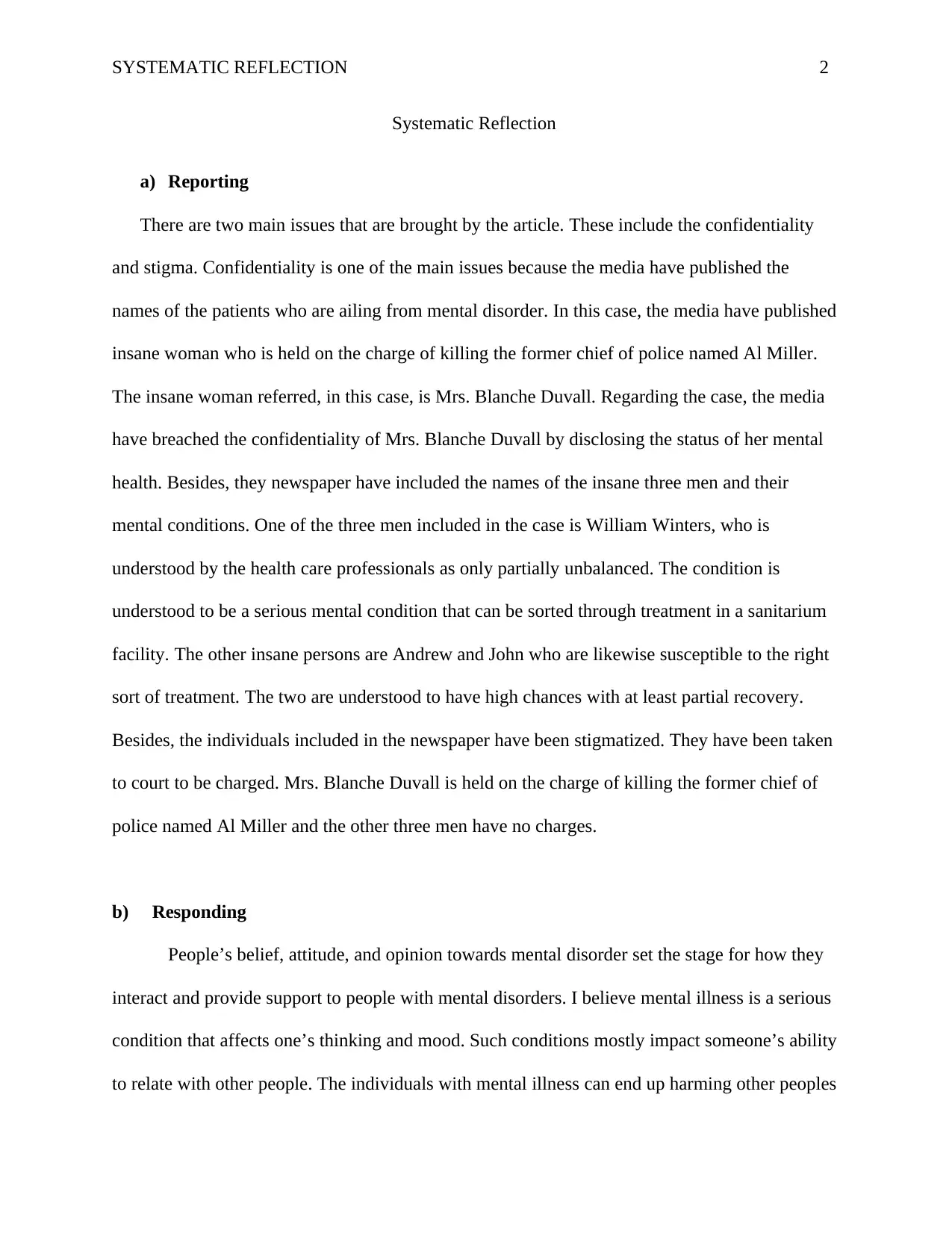
SYSTEMATIC REFLECTION 2
Systematic Reflection
a) Reporting
There are two main issues that are brought by the article. These include the confidentiality
and stigma. Confidentiality is one of the main issues because the media have published the
names of the patients who are ailing from mental disorder. In this case, the media have published
insane woman who is held on the charge of killing the former chief of police named Al Miller.
The insane woman referred, in this case, is Mrs. Blanche Duvall. Regarding the case, the media
have breached the confidentiality of Mrs. Blanche Duvall by disclosing the status of her mental
health. Besides, they newspaper have included the names of the insane three men and their
mental conditions. One of the three men included in the case is William Winters, who is
understood by the health care professionals as only partially unbalanced. The condition is
understood to be a serious mental condition that can be sorted through treatment in a sanitarium
facility. The other insane persons are Andrew and John who are likewise susceptible to the right
sort of treatment. The two are understood to have high chances with at least partial recovery.
Besides, the individuals included in the newspaper have been stigmatized. They have been taken
to court to be charged. Mrs. Blanche Duvall is held on the charge of killing the former chief of
police named Al Miller and the other three men have no charges.
b) Responding
People’s belief, attitude, and opinion towards mental disorder set the stage for how they
interact and provide support to people with mental disorders. I believe mental illness is a serious
condition that affects one’s thinking and mood. Such conditions mostly impact someone’s ability
to relate with other people. The individuals with mental illness can end up harming other peoples
Systematic Reflection
a) Reporting
There are two main issues that are brought by the article. These include the confidentiality
and stigma. Confidentiality is one of the main issues because the media have published the
names of the patients who are ailing from mental disorder. In this case, the media have published
insane woman who is held on the charge of killing the former chief of police named Al Miller.
The insane woman referred, in this case, is Mrs. Blanche Duvall. Regarding the case, the media
have breached the confidentiality of Mrs. Blanche Duvall by disclosing the status of her mental
health. Besides, they newspaper have included the names of the insane three men and their
mental conditions. One of the three men included in the case is William Winters, who is
understood by the health care professionals as only partially unbalanced. The condition is
understood to be a serious mental condition that can be sorted through treatment in a sanitarium
facility. The other insane persons are Andrew and John who are likewise susceptible to the right
sort of treatment. The two are understood to have high chances with at least partial recovery.
Besides, the individuals included in the newspaper have been stigmatized. They have been taken
to court to be charged. Mrs. Blanche Duvall is held on the charge of killing the former chief of
police named Al Miller and the other three men have no charges.
b) Responding
People’s belief, attitude, and opinion towards mental disorder set the stage for how they
interact and provide support to people with mental disorders. I believe mental illness is a serious
condition that affects one’s thinking and mood. Such conditions mostly impact someone’s ability
to relate with other people. The individuals with mental illness can end up harming other peoples
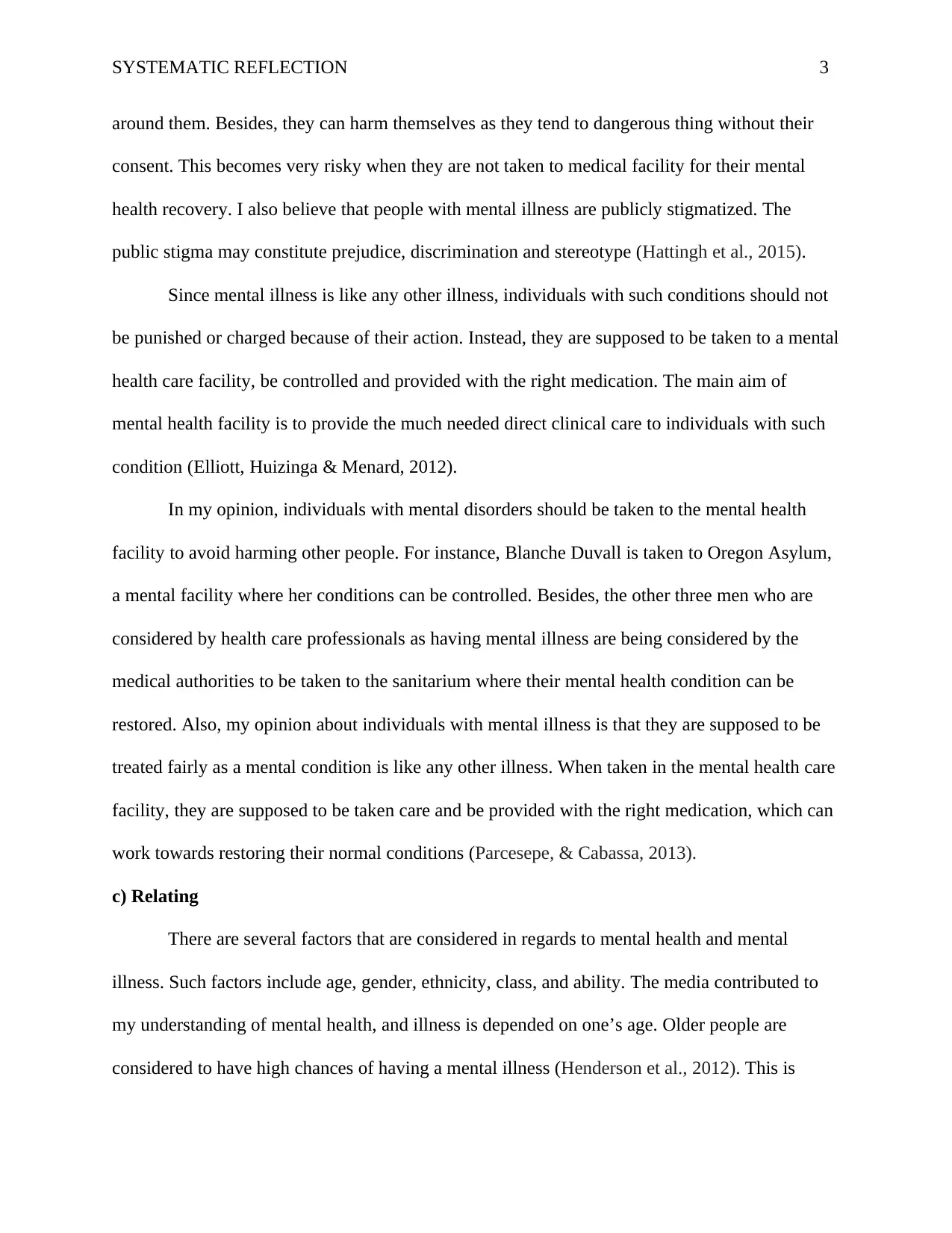
SYSTEMATIC REFLECTION 3
around them. Besides, they can harm themselves as they tend to dangerous thing without their
consent. This becomes very risky when they are not taken to medical facility for their mental
health recovery. I also believe that people with mental illness are publicly stigmatized. The
public stigma may constitute prejudice, discrimination and stereotype (Hattingh et al., 2015).
Since mental illness is like any other illness, individuals with such conditions should not
be punished or charged because of their action. Instead, they are supposed to be taken to a mental
health care facility, be controlled and provided with the right medication. The main aim of
mental health facility is to provide the much needed direct clinical care to individuals with such
condition (Elliott, Huizinga & Menard, 2012).
In my opinion, individuals with mental disorders should be taken to the mental health
facility to avoid harming other people. For instance, Blanche Duvall is taken to Oregon Asylum,
a mental facility where her conditions can be controlled. Besides, the other three men who are
considered by health care professionals as having mental illness are being considered by the
medical authorities to be taken to the sanitarium where their mental health condition can be
restored. Also, my opinion about individuals with mental illness is that they are supposed to be
treated fairly as a mental condition is like any other illness. When taken in the mental health care
facility, they are supposed to be taken care and be provided with the right medication, which can
work towards restoring their normal conditions (Parcesepe, & Cabassa, 2013).
c) Relating
There are several factors that are considered in regards to mental health and mental
illness. Such factors include age, gender, ethnicity, class, and ability. The media contributed to
my understanding of mental health, and illness is depended on one’s age. Older people are
considered to have high chances of having a mental illness (Henderson et al., 2012). This is
around them. Besides, they can harm themselves as they tend to dangerous thing without their
consent. This becomes very risky when they are not taken to medical facility for their mental
health recovery. I also believe that people with mental illness are publicly stigmatized. The
public stigma may constitute prejudice, discrimination and stereotype (Hattingh et al., 2015).
Since mental illness is like any other illness, individuals with such conditions should not
be punished or charged because of their action. Instead, they are supposed to be taken to a mental
health care facility, be controlled and provided with the right medication. The main aim of
mental health facility is to provide the much needed direct clinical care to individuals with such
condition (Elliott, Huizinga & Menard, 2012).
In my opinion, individuals with mental disorders should be taken to the mental health
facility to avoid harming other people. For instance, Blanche Duvall is taken to Oregon Asylum,
a mental facility where her conditions can be controlled. Besides, the other three men who are
considered by health care professionals as having mental illness are being considered by the
medical authorities to be taken to the sanitarium where their mental health condition can be
restored. Also, my opinion about individuals with mental illness is that they are supposed to be
treated fairly as a mental condition is like any other illness. When taken in the mental health care
facility, they are supposed to be taken care and be provided with the right medication, which can
work towards restoring their normal conditions (Parcesepe, & Cabassa, 2013).
c) Relating
There are several factors that are considered in regards to mental health and mental
illness. Such factors include age, gender, ethnicity, class, and ability. The media contributed to
my understanding of mental health, and illness is depended on one’s age. Older people are
considered to have high chances of having a mental illness (Henderson et al., 2012). This is
⊘ This is a preview!⊘
Do you want full access?
Subscribe today to unlock all pages.

Trusted by 1+ million students worldwide
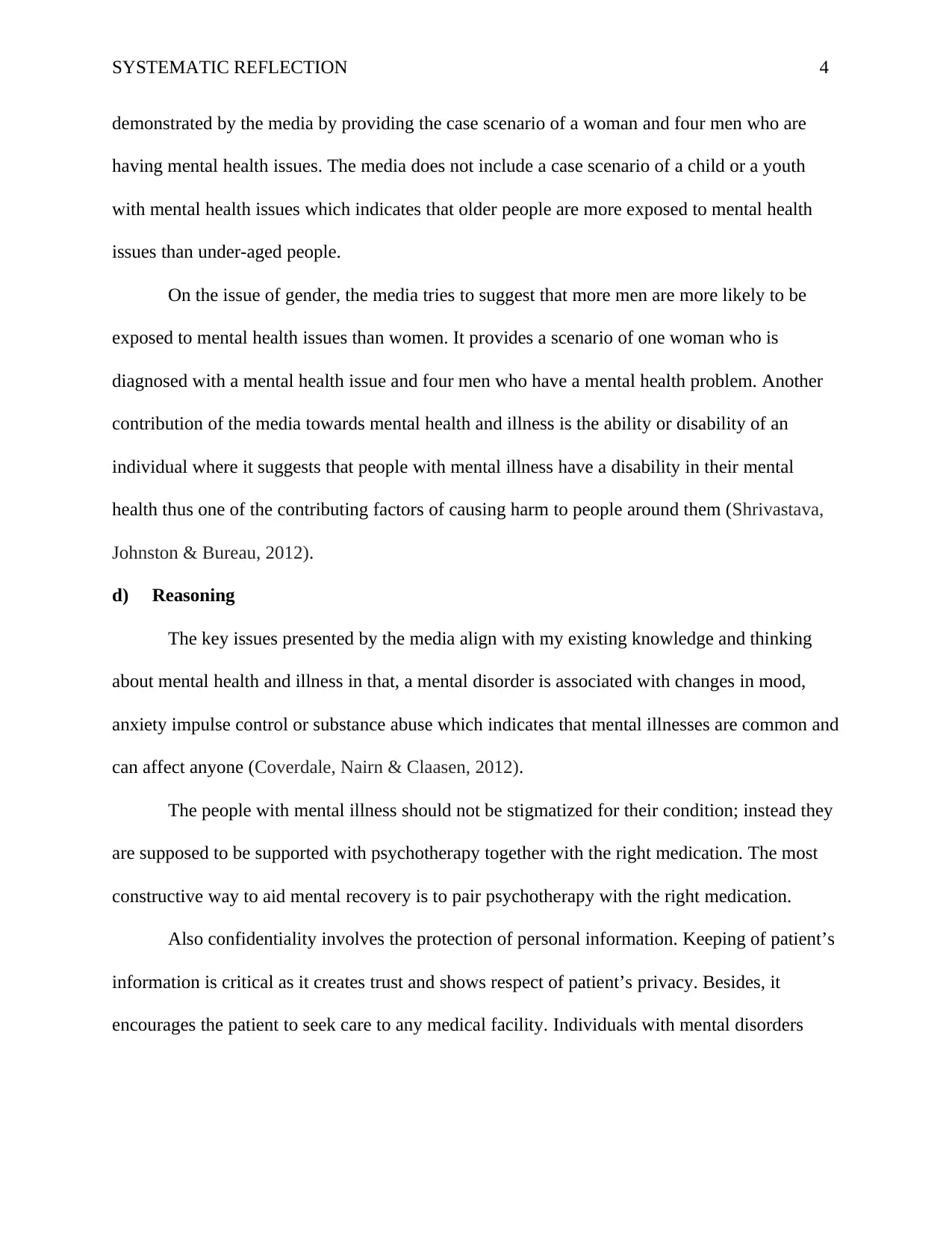
SYSTEMATIC REFLECTION 4
demonstrated by the media by providing the case scenario of a woman and four men who are
having mental health issues. The media does not include a case scenario of a child or a youth
with mental health issues which indicates that older people are more exposed to mental health
issues than under-aged people.
On the issue of gender, the media tries to suggest that more men are more likely to be
exposed to mental health issues than women. It provides a scenario of one woman who is
diagnosed with a mental health issue and four men who have a mental health problem. Another
contribution of the media towards mental health and illness is the ability or disability of an
individual where it suggests that people with mental illness have a disability in their mental
health thus one of the contributing factors of causing harm to people around them (Shrivastava,
Johnston & Bureau, 2012).
d) Reasoning
The key issues presented by the media align with my existing knowledge and thinking
about mental health and illness in that, a mental disorder is associated with changes in mood,
anxiety impulse control or substance abuse which indicates that mental illnesses are common and
can affect anyone (Coverdale, Nairn & Claasen, 2012).
The people with mental illness should not be stigmatized for their condition; instead they
are supposed to be supported with psychotherapy together with the right medication. The most
constructive way to aid mental recovery is to pair psychotherapy with the right medication.
Also confidentiality involves the protection of personal information. Keeping of patient’s
information is critical as it creates trust and shows respect of patient’s privacy. Besides, it
encourages the patient to seek care to any medical facility. Individuals with mental disorders
demonstrated by the media by providing the case scenario of a woman and four men who are
having mental health issues. The media does not include a case scenario of a child or a youth
with mental health issues which indicates that older people are more exposed to mental health
issues than under-aged people.
On the issue of gender, the media tries to suggest that more men are more likely to be
exposed to mental health issues than women. It provides a scenario of one woman who is
diagnosed with a mental health issue and four men who have a mental health problem. Another
contribution of the media towards mental health and illness is the ability or disability of an
individual where it suggests that people with mental illness have a disability in their mental
health thus one of the contributing factors of causing harm to people around them (Shrivastava,
Johnston & Bureau, 2012).
d) Reasoning
The key issues presented by the media align with my existing knowledge and thinking
about mental health and illness in that, a mental disorder is associated with changes in mood,
anxiety impulse control or substance abuse which indicates that mental illnesses are common and
can affect anyone (Coverdale, Nairn & Claasen, 2012).
The people with mental illness should not be stigmatized for their condition; instead they
are supposed to be supported with psychotherapy together with the right medication. The most
constructive way to aid mental recovery is to pair psychotherapy with the right medication.
Also confidentiality involves the protection of personal information. Keeping of patient’s
information is critical as it creates trust and shows respect of patient’s privacy. Besides, it
encourages the patient to seek care to any medical facility. Individuals with mental disorders
Paraphrase This Document
Need a fresh take? Get an instant paraphrase of this document with our AI Paraphraser
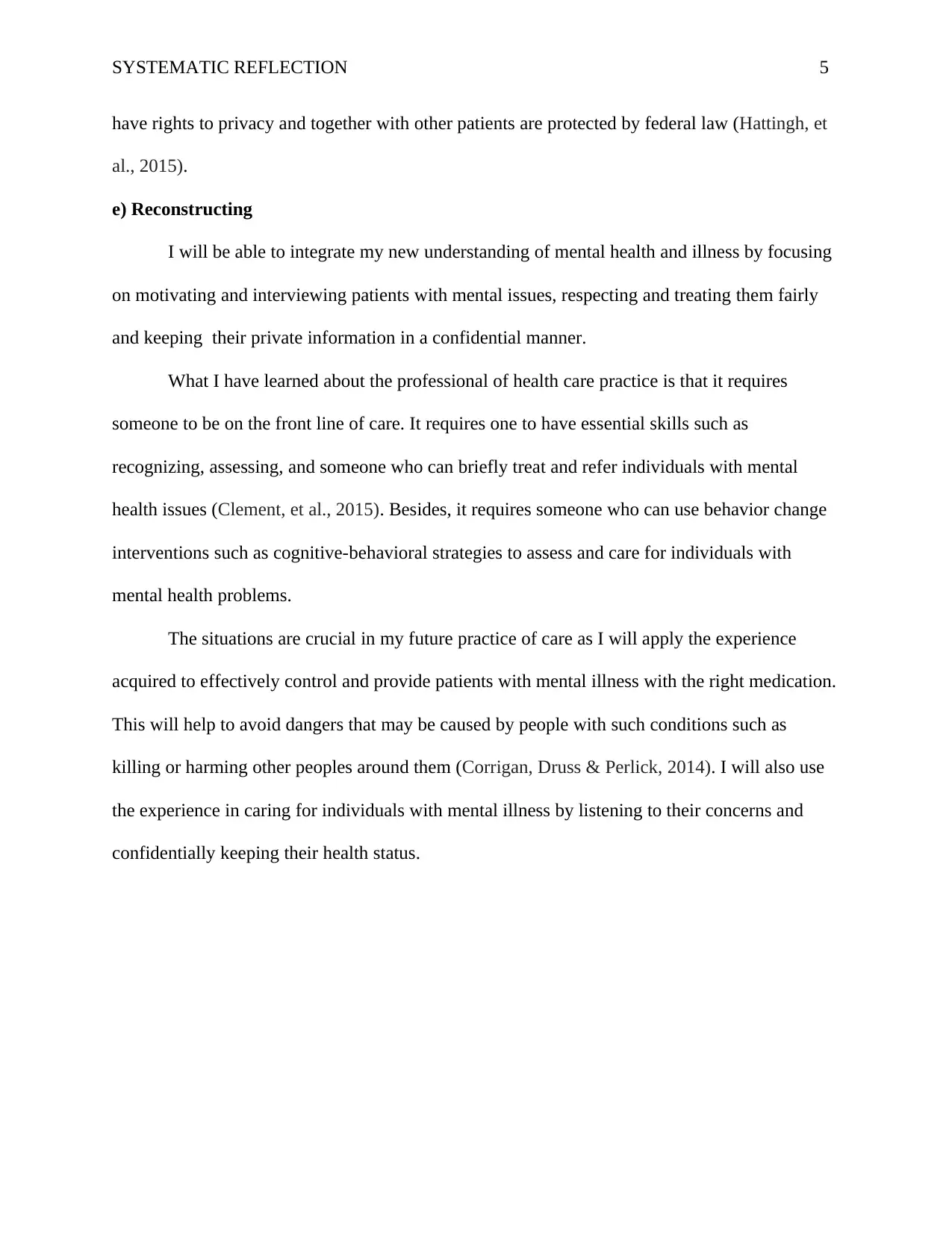
SYSTEMATIC REFLECTION 5
have rights to privacy and together with other patients are protected by federal law (Hattingh, et
al., 2015).
e) Reconstructing
I will be able to integrate my new understanding of mental health and illness by focusing
on motivating and interviewing patients with mental issues, respecting and treating them fairly
and keeping their private information in a confidential manner.
What I have learned about the professional of health care practice is that it requires
someone to be on the front line of care. It requires one to have essential skills such as
recognizing, assessing, and someone who can briefly treat and refer individuals with mental
health issues (Clement, et al., 2015). Besides, it requires someone who can use behavior change
interventions such as cognitive-behavioral strategies to assess and care for individuals with
mental health problems.
The situations are crucial in my future practice of care as I will apply the experience
acquired to effectively control and provide patients with mental illness with the right medication.
This will help to avoid dangers that may be caused by people with such conditions such as
killing or harming other peoples around them (Corrigan, Druss & Perlick, 2014). I will also use
the experience in caring for individuals with mental illness by listening to their concerns and
confidentially keeping their health status.
have rights to privacy and together with other patients are protected by federal law (Hattingh, et
al., 2015).
e) Reconstructing
I will be able to integrate my new understanding of mental health and illness by focusing
on motivating and interviewing patients with mental issues, respecting and treating them fairly
and keeping their private information in a confidential manner.
What I have learned about the professional of health care practice is that it requires
someone to be on the front line of care. It requires one to have essential skills such as
recognizing, assessing, and someone who can briefly treat and refer individuals with mental
health issues (Clement, et al., 2015). Besides, it requires someone who can use behavior change
interventions such as cognitive-behavioral strategies to assess and care for individuals with
mental health problems.
The situations are crucial in my future practice of care as I will apply the experience
acquired to effectively control and provide patients with mental illness with the right medication.
This will help to avoid dangers that may be caused by people with such conditions such as
killing or harming other peoples around them (Corrigan, Druss & Perlick, 2014). I will also use
the experience in caring for individuals with mental illness by listening to their concerns and
confidentially keeping their health status.
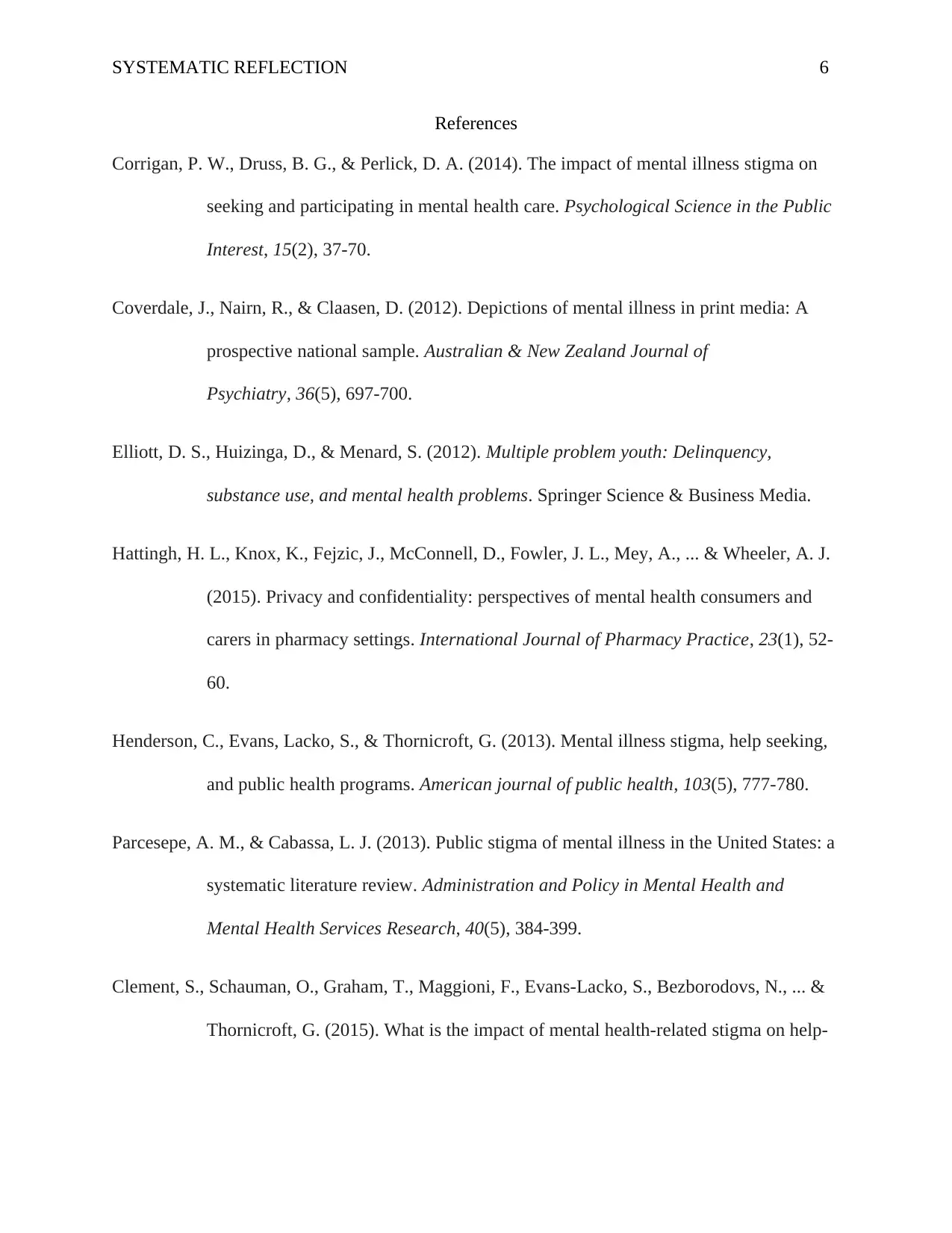
SYSTEMATIC REFLECTION 6
References
Corrigan, P. W., Druss, B. G., & Perlick, D. A. (2014). The impact of mental illness stigma on
seeking and participating in mental health care. Psychological Science in the Public
Interest, 15(2), 37-70.
Coverdale, J., Nairn, R., & Claasen, D. (2012). Depictions of mental illness in print media: A
prospective national sample. Australian & New Zealand Journal of
Psychiatry, 36(5), 697-700.
Elliott, D. S., Huizinga, D., & Menard, S. (2012). Multiple problem youth: Delinquency,
substance use, and mental health problems. Springer Science & Business Media.
Hattingh, H. L., Knox, K., Fejzic, J., McConnell, D., Fowler, J. L., Mey, A., ... & Wheeler, A. J.
(2015). Privacy and confidentiality: perspectives of mental health consumers and
carers in pharmacy settings. International Journal of Pharmacy Practice, 23(1), 52-
60.
Henderson, C., Evans, Lacko, S., & Thornicroft, G. (2013). Mental illness stigma, help seeking,
and public health programs. American journal of public health, 103(5), 777-780.
Parcesepe, A. M., & Cabassa, L. J. (2013). Public stigma of mental illness in the United States: a
systematic literature review. Administration and Policy in Mental Health and
Mental Health Services Research, 40(5), 384-399.
Clement, S., Schauman, O., Graham, T., Maggioni, F., Evans-Lacko, S., Bezborodovs, N., ... &
Thornicroft, G. (2015). What is the impact of mental health-related stigma on help-
References
Corrigan, P. W., Druss, B. G., & Perlick, D. A. (2014). The impact of mental illness stigma on
seeking and participating in mental health care. Psychological Science in the Public
Interest, 15(2), 37-70.
Coverdale, J., Nairn, R., & Claasen, D. (2012). Depictions of mental illness in print media: A
prospective national sample. Australian & New Zealand Journal of
Psychiatry, 36(5), 697-700.
Elliott, D. S., Huizinga, D., & Menard, S. (2012). Multiple problem youth: Delinquency,
substance use, and mental health problems. Springer Science & Business Media.
Hattingh, H. L., Knox, K., Fejzic, J., McConnell, D., Fowler, J. L., Mey, A., ... & Wheeler, A. J.
(2015). Privacy and confidentiality: perspectives of mental health consumers and
carers in pharmacy settings. International Journal of Pharmacy Practice, 23(1), 52-
60.
Henderson, C., Evans, Lacko, S., & Thornicroft, G. (2013). Mental illness stigma, help seeking,
and public health programs. American journal of public health, 103(5), 777-780.
Parcesepe, A. M., & Cabassa, L. J. (2013). Public stigma of mental illness in the United States: a
systematic literature review. Administration and Policy in Mental Health and
Mental Health Services Research, 40(5), 384-399.
Clement, S., Schauman, O., Graham, T., Maggioni, F., Evans-Lacko, S., Bezborodovs, N., ... &
Thornicroft, G. (2015). What is the impact of mental health-related stigma on help-
⊘ This is a preview!⊘
Do you want full access?
Subscribe today to unlock all pages.

Trusted by 1+ million students worldwide

SYSTEMATIC REFLECTION 7
seeking? A systematic review of quantitative and qualitative studies. Psychological
medicine, 45(1), 11-27.
Shrivastava, A., Johnston, M., & Bureau, Y. (2012). Stigma of mental illness-1: Clinical
reflections. Mens sana monographs, 10(1), 70.
seeking? A systematic review of quantitative and qualitative studies. Psychological
medicine, 45(1), 11-27.
Shrivastava, A., Johnston, M., & Bureau, Y. (2012). Stigma of mental illness-1: Clinical
reflections. Mens sana monographs, 10(1), 70.
1 out of 7
Related Documents
Your All-in-One AI-Powered Toolkit for Academic Success.
+13062052269
info@desklib.com
Available 24*7 on WhatsApp / Email
![[object Object]](/_next/static/media/star-bottom.7253800d.svg)
Unlock your academic potential
Copyright © 2020–2026 A2Z Services. All Rights Reserved. Developed and managed by ZUCOL.





